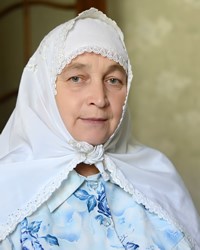The Tatars speak a language that is also called Tatar. The name Tatar means "archer." The Tatar people have had a strong civilization since the tenth century. It has survived the Mongol invasion of the thirteenth century and the Russian conquest of the sixteenth century. In the 1800s, Tatar cities ranked among the greatest cultural centers of the Islamic world.
The physical appearance of the Tatars varies from blue-eyed blondes to Mongoloid features. In general, they have oval faces with little facial hair. The Tatar are a settled people, mostly farmers and merchants, who have completely lost their traditional tribal structure.
The Tatars are a group of Turkic people with sizable colonies in virtually every republic of the former Soviet Union. Although most of them live around the Volga region, others inhabit Azerbaijan, Byelorussia, the Ukraine, Romania, and the Central Asian republics. Those who live in Romania live in the southeastern part of the country.
Among the Tatars, the father is the legal head of the household. He is also in charge of the family income and how it is spent. The women usually cook, carry water, wash clothes, and tend to the livestock, while the men do more strenuous labor in the fields. The Tatar people enjoy the arts; especially theater, the orchestra, opera, and ballet. The younger generation of Tatars wear contemporary city-style clothing. However, the older, collective farm members wear traditional dress.
In Romania, Tatars are the main Muslim people group. They are sometimes associated with Turks in that country. Tatars are well accepted by the Romanian majority.
The Tatars have not forgotten the history of ill treatment from Christian Russia
Many Tatars will identify themselves as Muslims before they will identify themselves as Tatars. Unlike devout Muslims, however, some of the Tatar will eat pork, and very few observe the prescribed Islamic fasts. Although the Tatar are primarily Islamic, many still observe sabantuy, or "rites of spring." This is an ancient agricultural festival celebrated on June 25. This celebration has its origins in shamanism (the belief in an unseen world of gods, demons, and ancestral spirits).
While Muslims believe that there is only one god, many Tatar also honor saints and holy places. Some beliefs in supernatural powers such as the "evil eye" (the ability to curse someone with a glance) still exist from their pre-Islamic days.
The Tatar's beliefs remain more liberal and intellectual than the beliefs held by the more orthodox Muslims of Central Asia or the Caucasus. For instance, in many of their mosques, prayer times have been arranged so as not to conflict with work schedules. Women have also been encouraged to join the men at the mosques instead of praying at home, as is the usual custom.
Christian laborers are needed to live and work among the Tatars of Romania. Translation of the Bible began in the 1970s, and it was completed in 2016.
Ask the Lord to call people who are willing to go to Romania and share Christ with the Tatar people.
Ask God to use Tatar believers to share the love of Jesus with their friends and families.
Pray that the Lord will raise up loving Romanian believers to share the gospel message with the Tatars.
Ask the Lord to raise up strong local churches among the Tatars in Romania.
Scripture Prayers for the Tatar in Romania.
https://joshuaproject.net/people_groups/15284/RS
https://en.wikipedia.org/wiki/Tatars_of_Romania
https://en.wikipedia.org/wiki/Democratic_Union_of_Turkish-Muslim_Tatars_of_Romania
| Profile Source: Keith Carey |











